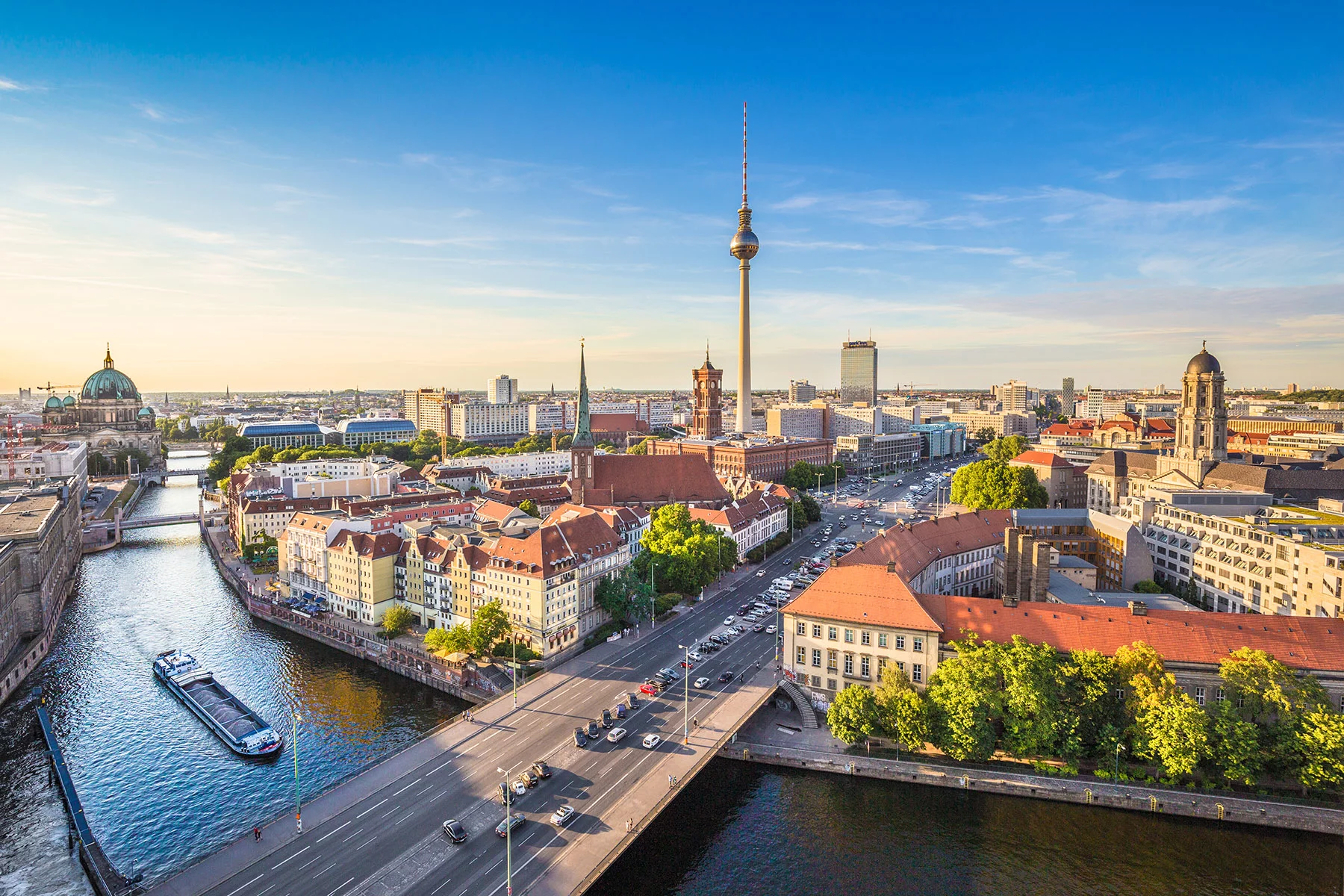Germany is the richest country in the European Union (EU). Its comfortable living standards attract tens of thousands of expats each year.
However, life in Germany doesn’t come without its price tag. This overview of monthly expenses will give you a clear picture of what it really costs to make the country your new home.
Continue reading for the following information:
Wundertax
Rethink the way you do your tax returns with Wundertax. Their easy-to-use website guides expats through every step of the German tax return process, giving you more time to explore your new home. For simple and intuitive help in English, use Wundertax for your tax returns.
What is the state of Germany’s economy?
Germany is the largest economy in the European Union (EU), with a gross domestic product (GDP) of €4.3 trillion, or €36,130 per capita (2024).
The Economic Commission (EC) forecasts that the country’s GDP will grow by 0.7% in 2025 and 1.3% in 2026, well below the EU average of 1.5% and 1.8% for the two years.

Despite this incredibly rosy outlook, Eurostat (2023) reports that around 27.9% of Germans are at risk of poverty, and 13.3% of people can’t afford a meal with meat, chicken, fish, or a vegetarian equivalent every second day.
The Federal Statistics Office (Statistisches Bundesamt) feels these numbers are exaggerated. Instead, they believe that 15.5% of the population is at risk of poverty, and 20.9% may experience poverty or social exclusion.
Inflation and disposable income in Germany in 2025
Of course, the GDP per capita doesn’t mean all German residents have just under 36K to spend. The equivalized disposable income (i.e., the total net income of all household members divided by the weighted number of household members) is €27,556 per person (2024).
This is above the EU average of €20,350 per person (2024). Our article on minimum wage in Germany explains more about average salaries and income.
In terms of purchasing power, Germany’s average headline inflation for 2025 is expected to be 2.1%, below the European Union’s average of 2.2%. This figure is likely to decline to 1.9% in 2026, again below the EU average of 2%.
Germany compared to its neighbors
Germany is surrounded by strong economic players such as France, the Netherlands, and Poland. As well as being the EU’s largest economy, it is the fourth-largest in the world.
Its central location in Europe and world-class infrastructure make it a hub for transport, trade, and innovation. It is also a key member of the EU, playing a crucial role in shaping economic policies within the bloc.
Germany is the world’s third-largest importer and exporter. Its main trading partners are the US, France, and the Netherlands, and its leading exports are cars, motor vehicle parts and accessories, and packaged medicaments.
The cost of living in Germany in 2025
According to the Federal Statistics Office, the average household expenses in Germany in 2022 accumulated to €2,846 per month. It’s worth noting that the data excludes farmers, self-employed persons, and households with a monthly net income of €18,000 or more.

On average, you’ll need:
| Food, drink, tobacco | €417 | Transportation | €347 |
| Housing and utilities | €1,025 | Recreation, sports, culture | €245 |
| Healthcare | €118 | Restaurants and hotels | €177 |
| Internet and telecom | €122 | Education | €19 |
| Clothing and footwear | €103 | Other | €273 |
| Total | €2,846 |
Considering the inflation rate of 6.0% in 2023, 2.4% in 2024, and 2.1% in 2025, it’s recommended that your monthly budget have at least €3,154 per household.
Keep reading for an overview of the cost of living expenses you might come across in your daily life.
The price of groceries
Groceries are the second-largest expense after housing costs. In 2022, German households spent an average of €417 per month on food, beverages, and tobacco. The data doesn’t differentiate between alcoholic and non-alcoholic drinks.
Food and drink
Following the Russian invasion of Ukraine in 2022, Germany saw a massive increase in food prices. In 2023, dairy products and eggs were around 16% more expensive than the year before. Meat and meat products saw a price spike of roughly 8.3%, and vegetables cost around 13% more.

Food prices have since dropped a little. The average price ranges* of basic supermarket items include:
| Product | Price range | Product | Price range |
| Apples (1 kilo) | €2.00–5.00 | Potatoes (1 kilo) | €1.20–4.00 |
| Bread (1 loaf) | €1.10–5.90 | Regular milk (1 liter) | €1.30–2.30 |
| Cheese (1 kilo) | €11.00–27.90 | Rice (1 kilo) | €1.80–5.80 |
| Coffee (1 kilo) | €9.00–20.50 | Tea (per bag) | €0.02–0.20 |
| Eggs (10) | €2.40–5.40 | Tomatoes (1 kilo) | €3.00–10.00 |
| Orange juice (1 liter) | €1.30–5.10 | Water (1 liter) | €0.50–1.80 |
Beer, wine, and liquor
From Hefeweizen and Jägermeister to Riesling and Glühwein, Germany has some great choices in alcoholic beverages. In 2023, the country was the largest beer producer in the EU, including beer with less than 0.5% alcohol content. German drinkers consume around 10.7 liters of pure alcohol per year (2020), with most people preferring beer.
A pilsner in a local bar or restaurant will set you back around €3.50–5.50, while a craft one costs about €4.00–6.50. A glass of wine, on the other hand, costs between €4.50–6.50.
Alcohol is much, much cheaper in supermarkets. You can get a beer from as little as €0.90, depending on the make and size. You can usually get a decent bottle of wine for between €4 and €10. The price of most liquor (e.g., gin, vodka, or Korn) starts from €4.00–6.50, depending on your drink of choice.
Hygienic and household products
Hygienic and household products include everything from toothpaste and shampoo to dish soap (or washing-up liquid) and toilet bleach. The average price ranges* of these necessities include:
| Product | Price range | Product | Price range |
| All-purpose cleaner (1 liter) | €1.90–4.70 | Shampoo (300 ml) | €1.10–12.00 |
| Deodorant (200 ml) | €1.50–5.70 | Soap (1 liter) | €1.50–18.40 |
| Dish soap (1 liter) | €1.00–3.00 | Tampons (per tampon) | €0.04–0.24 |
| Garbage bags (per bag) | €0.03–0.50 | Toilet paper (per roll) | €0.37–1.30 |
| Laundry detergent (per load) | €0.08–0.37 | Toothpaste (75 ml) | €1.20–7.49 |
Housing costs
In 2022, the average housing costs were roughly €1,025 per household per month. This included rent and mortgage payments, water, electricity, gas, other fuels, and general maintenance.

Rent and property prices
Property prices differ significantly throughout Germany. For example, houses in Berlin, Düsseldorf, Frankfurt, Hamburg, and Munich (München) are comparatively more expensive than in rural areas and less popular cities.
In 2023, the average monthly rent for a home in Germany was €957. In Q3 2023, potential homeowners paid an average of €3,931 per square meter for apartments and €3,539 per square meter for houses. Real estate prices have since dropped, according to the Federal Statistics Office.
Depending on the location, you’ll pay the following average housing prices:
| Average monthly rent | Average property price per square meter (apartment) | Average property price per square meter (house) | |
| Berlin | €1,317 | €5,036 | €3,839 |
| Hamburg | €996 | €4,476 | €3,493 |
| Frankfurt | €1,156 | €3,857 | €3,504 |
| Munich | €1,398 | €7,119 | €6,027 |
| Stuttgart | €1,023 | €3,911 | €4,107 |
The most expensive places are Berlin, Frankfurt, Munich, and Düsseldorf. However, if you’re looking to live in Belgium on a budget, the cheapest cities to move to are:
| Average monthly rent | Average property price per square meter (apartment) | Average property price per square meter (house) | |
| Cologne (Köln) | €929 | €3,531 | €3,125 |
| Dortmund | €624 | €2,174 | €2,715 |
| Dresden | €622 | €3,000 | €2,955 |
| Düsseldorf | €970 | €3,495 | €3,082 |
| Hannover | €728 | €2,711 | €2,544 |
Find out more about the real estate market and property prices by visiting our articles on buying property and renting in Germany. Our article on where to live highlights popular residential areas for expats. You can also check out available housing at online portals such as:
Utility bills: water, gas, electricity
Even with the so-called national ‘price brake’ on gas and electricity, Germany has one of the highest utility costs in the EU. Depending on your use and property price, you can expect to pay around €200–495 per month on utilities in 2025.

Of course, the price of water, gas, and electricity varies per federal state. In Germany, water costs an average of €1.83/cubic meter (2022). The EC reports that, during the second half of 2023, German households paid €0.0925 kilowatt/hour for gas (EU average: €0.0802) and €0.2806 kilowatt/hour (EU average: €0.2187 for electricity.
You can learn more about regional differences and providers by reading our article on utilities in Germany.
Healthcare
Everyone living and working in Germany must have health insurance. The public healthcare system has (almost) universal coverage, though some copayments are required for prescription meds and certain medical procedures.
Many locals and expats take out supplemental private health insurance to access shorter waiting times and a wider choice of doctors and specialists. It also offers more coverage for other healthcare services, such as dentistry or vision care.
Basic insurance packages start from as little as €11 a month. The more comprehensive the plan, the higher the cost will be. Older adults and those with pre-existing conditions may also face higher premiums.
In 2022, German households spent an average of €118 per month on health.
Internet and telecom
While relatively expensive, the cost of internet and other telecommunication services in Germany varies per location and service. For example, you can often get a discount when you get a telecom package that includes TV, internet, and home phone.

You can install fiber internet for as low as €9.99 a month (excluding installation), though your internet speed will not be great. Of course, the price increases exponentially after the initial sign-up offer has expired (usually after six months). Costs also rise when you want to improve the speed or add (more) TV channels.
Mobile phone plans are similarly expensive. Typical phone deals start from €14.95, but these come with little call minutes and internet data. To give you an indication of what to expect, average monthly communication costs in 2022 amounted to €122 per person.
Clothing and footwear
The price of clothes and shoes in Germany is in line with other EU countries. In 2022, people spent a monthly average of €103 on their attire.
The cost of clothing and footwear varies greatly, depending on the type and brand. For example, underwear costs around €3.50–6.00. Dresses and jeans, on the other hand, cost between €25 and €100. Business shoes for men and women range from €40 to €200.

Designer brands are more expensive, of course. The price of luxury clothing and accessories is similar to that in other parts of Europe.
Transportation
In 2022, Germans spent an average of €347 per month on transportation.
Public transport
While delays are very common, public transport in Germany is generally seen as having an exceptionally high standard. You can catch the bus, metro, train, or tram at reasonable prices. According to Numbeo’s cost of living in Germany, a single bus or metro fare costs between €3–4 in all major cities.
Bicycle-sharing services are also becoming more popular. While not necessarily part of the public transportation system, these present an affordable option for getting around the area. The two largest market players are the Deutsche Bahn’s Call a Bike and nextbike. Subscription plans and tariffs vary; you should check the availability and prices in your region.
If you are planning to commute to work, it’s recommended you get a monthly or yearly plan to travel at a reduced rate.
Driving and vehicle costs
Germany and cars go hand in hand. However, driving your own vehicle is a costly business. According to the 2022 Car Cost Index, it is the sixth most expensive country in Europe to own a car, after Switzerland, Norway, the Netherlands, Portugal, and Czechia. German vehicle owners pay an average of €1,130 per year.

Beyond the costs of lessons, a driving license, and the actual purchase of the vehicle, you’ll need to budget for:
- Car insurance – the mandatory liability insurance costs €260–360 a year
- Annual Road Tax – the amount depends on the region, as well as the engine power of your vehicle
- Fuel costs – as of February 2025, gasoline costs €1.75 per liter, and diesel costs €1.69 per liter
- Maintenance – car maintenance typically costs around €60–210, depending on the vehicle type and your location
Our article on driving in Germany covers more about costs, mandatory insurance, and driving regulations.
Leisure activities
If you’re living on a budget, you might not include leisure activities in your monthly expenses. However, in 2022, German households spent €245 per month on recreation, sports, and culture, and €177 per month on restaurants and hotels. With that totalling to €422, it might be something to factor in.
Movie theaters and cinemas
The average movie ticket in Germany costs around €9–11, depending on the location. Prices may rise to €12–15 on weekends. Some cinemas offer monthly passes that allow you to watch unlimited movies for an x amount of money. Others have discounted days and tickets, offering screenings for as low as €6–9.
Restaurants
Germany has some excellent choices for going out to dinner. Depending on your taste and date night, a meal at an inexpensive diner costs roughly €15–30. A three-course meal at a mid-range restaurant, on the other hand, can set you back €60–100. Then again, a döner kebab costs around €7 per piece.
Tips are not included in the bill; German etiquette prescribes a tip of 5–10% of the total amount.

Sports
If you are planning on joining a gym, you can expect to pay about €25–50 a month, depending on your location and membership. It’s worth trying out different gyms before signing up for a plan. Alternatively, you can join a local club to pick up a team sport.
Education and childcare
In 2022, people spent only €19 per month on education. Naturally, this cost of living expense does not include childcare in Germany.
Childcare
Working parents with (young) children may need to arrange for childcare from time to time. In Germany, options include daycares, independent childminders, kindergartens, and nurseries.
Public childcare facilities typically charge parents based on their income. In 2025, these cost between €15 and €400 per month. You can also send your child to private or international childcare, where monthly fees average around €1,000.
Some expat families may want to hire a nanny or au pair. Nannies have an average hourly rate of €17, whereas au pairs require room and board, as well as a minimum salary of €280 a month.
Children’s education
Germany’s public schools are funded by the government. There are no tuition fees, and parents only pay for food, materials, and outings.

Some expat parents may prefer to send their children to an international school. These private schools charge varying tuition fees, depending on their location, curriculum, and your child’s grade. For example, the annual cost of an elementary school ranges from €3,500 to €15,00. High school students, on the other hand, pay an average of €20,000 a year.
You can read more about school curriculums and fees in our article on international schools in Germany.
University tuition fees
Public universities are free for most students, the exception being study programs for people with prior professional experience. Tuition fees at private universities can reach up to €15,000 per year for bachelor’s degrees and €20,000 for master’s degrees.
University graduates who continue to work in Germany can usually deduct their tuition fees from their income tax. In that case, you should seek advice from a tax accountant, such as:
Learn more about university degrees and requirements by reading our article on studying in Germany.
How does Germany compare to the rest of the world?
Germany scores excellent grades on the OECD Better Life Index, which measures standards of living. The country outperforms the average on all fronts, including health, employment, work-life balance, education, environmental quality, safety, civic engagement, and life satisfaction.
Likewise, the Human Development Index ranks Germany as the 9th best in the world.

The highest city in Germany on Mercer’s 2024 quality of living index is Frankfurt (7th), which is followed by Munich (11th) and Düsseldorf (16th). The cities are below Zurich (1st), Vienna (2nd), and Copenhagen (4th), but above Stockholm (18th) and Paris (34th). Other German cities are ranked:
- Berlin – 19th
- Hamburg – 28th
- Stuttgart – 46th
- Nuremberg – 35th
- Leipzig – 64th
The cost of living in Berlin
Surprisingly, the cost of living in Berlin is cheaper than many other major cities in Germany and capital cities around the world. However, prices have risen in recent years. The metropolis ranks 31st on Mercer’s 2024 cost of living index, meaning it is considerably cheaper to live in than Zurich (Switzerland), Copenhagen (Denmark), and Vienna (Austria).
Compared to other capital cities, Berlin’s cost of living is (as of February 2025):
- 40.7% cheaper than New York (US)
- 22.9% cheaper than London (UK)
- 11.9% cheaper than Amsterdam (the Netherlands)
- 37.4% more expensive than Warsaw (Poland)
- 55% more expensive than Bucharest (Romania)
- 107% more expensive than Kyiv (Ukraine)
- 172.5% more expensive than Delhi (India)
The cost of living in Munich
Munich is Germany’s third-largest city, with a total population of roughly 1.5 million people (2025). Bavaria’s state capital has a thriving tech scene and is home to some of the country’s most valuable startup unicorns, causing the city to be dubbed the “California of Europe”.

The cost of living in Munich is among the highest in Germany. Compared to other cities around the world, life in the city is (as of February 2025):
- 34.7% cheaper than New York
- 15% cheaper than London
- 3% cheaper than Amsterdam
- 51.3% more expensive than Warsaw
- 70.8% more expensive than Bucharest
- 128% more expensive than Kyiv
- 200.1% more expensive than Delhi
The cost of living in Stuttgart
The state capital of Stuttgart is the largest city in the German state of Baden-Württemberg and the sixth largest in Germany. While covering a variety of hills with vineyards, valleys, and parks, the city is – paradoxically – known as the “cradle of the automobile”.
Compared to other major cities, the cost of living in Stuttgart is (as of February 2025):
- 40.3% cheaper than New York
- 22.3% cheaper than London
- 11.3% cheaper than Amsterdam
- 38.3% more expensive than Warsaw
- 56.1% more expensive than Bucharest
- 108.4% more expensive than Kyiv
- 174.3% more expensive than Delhi
The cost of living in Heidelberg
Heidelberg is a city that revolves around the university and scientific research, while also a favorite among visitors for its riverside location and historic town center. Living in this city offers a mix of old and new.

The cost of living in Heidelberg is typically lower than in Frankfurt or Munich (as of February 2025), as well as:
- 38.5% cheaper than New York
- 20% cheaper than London
- 8.7% cheaper than Amsterdam (the Netherlands)
- 42.4% more expensive than Warsaw (Poland)
- 60.7% more expensive than Bucharest (Romania)
- 114.6% more expensive than Kyiv (Ukraine)
- 182.5% more expensive than Delhi (India)
Financial aid for the cost of living in Germany
German residents are entitled to financial aid and social security benefits, depending on their situation. For example, certain no (or low) income households may apply for the Citizen’s Benefit (Bürgergeld) and free childcare.
Other benefits that can help you with the cost of living in Germany:
- Benefits in case of accidents at work or occupational diseases – available to people who are at risk of accidents in the workplace or occupational diseases
- Disability benefits – for people living with disabilities
- Family benefits – to help with the cost of raising a child
- Long-term care benefits – for persons who require specific equipment or long-term care
- Sickness benefits – available to workers who are unfit to work for the long term
- State benefits – to help survivors of war, violence, or state injustice, persons injured in military service or community service, or by vaccinations
- Unemployment benefits – for people who are in between jobs
If you are unable to pay for food and groceries, you can register with the German foodbank (Tafel Deutschland) for help.
Useful resources
- The Federal Ministry for the Environment, Nature Conservation, Nuclear Safety and Consumer Protection (Bundesministerium für Umwelt, Naturschutz, nukleare Sicherheit und Verbraucherschutz – BMUV) – official ministry responsible for consumer protections
- The Federation of German Consumer Organisations (Verbraucherzentrale Bundesverband – vzbv) – official website of Germany’s independent watchdog for consumers












